
French Lessons. There they are again on my list of goals for 2015. I shudder to think how many years “French Lessons” have hovered near the top of my annual list of aspirations deemed important in moving toward personal-fulfillment or, from a practical standpoint in the case of French, to making travel in Provence a lot easier. Right up there with writing, reading novels, travel, wine, squash, and running, all areas of my life in which I hope to make progress. (I finally dropped piano playing.)
At sixty, I no longer harbor illusions of speaking fluent French. My ambitions are greatly reduced. At this point in my life, if I could expand my comfort zone to include more tenses than le présent de l’indicatif and passé composé, I would feel I had accomplished something significant. The roller coaster ride on the way to fluent French has not been in vain, though. I’ve learned other lessons, many of which transcend learning any foreign language and have undoubtedly propelled me closer to who I’d like to be than conjugating 14 tenses of French would ever have done for me.
I’ve mastered the fine art of laughing at myself, cultivated greater patience and even more empathy (already in abundance people would say), and, most importantly, accepted that success is measured in many ways.
When learning a language, one has to have a sense of humor and a strong sense of self that is well insulated and wrapped in thick skin. Because, as only those of you who strive to acquire another language can fully appreciate, the experience is famously riddled with opportunities for everything to go awry, leaving the speaker standing painfully naked before the listener. There are French words that will never pass my lips again for fear of such exposure.
At the top of that list of French words to avoid at all costs is cou (speaking of feeling naked). I was forewarned by my French teacher to tread carefully—and with pursed lips—when introducing cou, the French word for neck, into friendly conversation. Feeling uncharacteristically confident one morning in the pharmacy in Lourmarin, I neglected to heed this sage piece of advice. After a futile attempt to recall gorge to describe my daughter’s sore throat to the pharmacist, I thought of cou for a reasonable substitute. Cou, predictably, failed to emerge properly from my mis-shaped American lips and much to my daughter’s chagrin, out came cul, a somewhat vulgar term for the other end of the torso.
Even the slightest mispronunciation can wreak havoc when speaking French. Asking someone to répétez takes on a completely different meaning when the first ‘e’ is not accented. Instead of requesting that something you’ve not heard be repeated, you could easily find yourself asking the person with whom you are having a nice conversation to pass gas again if you inadvertently substitute “repétez.”
Slightly less embarrassing, I once told a store owner that I was looking for a crevette for a gift for my nephew rather than a cravate. That is to say, a shrimp rather than a necktie. My husband hastens to remind me that I have, on more than one occasion, introduced him, not as a “mon mari,” my husband, but as “ma mairie,” my town hall, or “ma mère,” my mother. Now, I just don’t introduce him.
Even our beagle has had to suffer through my attempts at speaking French. One November day, a handsome French man who was purchasing vegetables next to me in the Cucuron market, struck up a conversation with me. To be accurate, it was with our beagle, but, in any case, as he stroked her nose, he told her that it was the height of sanglier hunting season and that a dog with a nose as sensitive as hers could be very happy if she were out hunting wild boar in the Luberon. I replied, on her behalf, that indeed she does dream of being “a shoe.” When the man looked perplexed, I knew I had said “une chaussure” instead of “une chasseuse,” a hunter. It’s so hard to speak French.
A strong sense of self also enables one to more readily shed roles of authority when they require a command of the French language. The task of reporting our stolen car to the local gendarmes fell on the shoulders of our 11-year-old daughter, whose malleable brain had managed to absorb more French in a couple of months than I had in the previous six years. She took her temporary role in stride, probably even deriving some secret prepubescent pleasure from thinking she rather than her mother was in charge.
Learning to be patient while keeping a smile on one’s face also comes with the territory of learning a foreign language. Sometimes the avalanche of French conversation seems interminable but eventually it will come to a halt if for no other reason than a breath is necessary. At that point, someone–usually my husband—can surface with an English translation. Then, I know whether I should retain the smile pasted on my face or switch to another expression better suited to the contents of the discourse, about which, at least in the early days of French Lessons, I was known to have completely misunderstood. (Even today, years into these lessons, I am often bowled over by how one tiny error in translation on top of another can take one in a direction completely unrelated to the subject at hand.)
Friends and family, upon hearing these stories, marvel at the thickness of my skin and the perseverance with which I have pursued my goal of learning French. So most were not surprised when I announced my intention to enroll in a French language immersion course in the South of France.
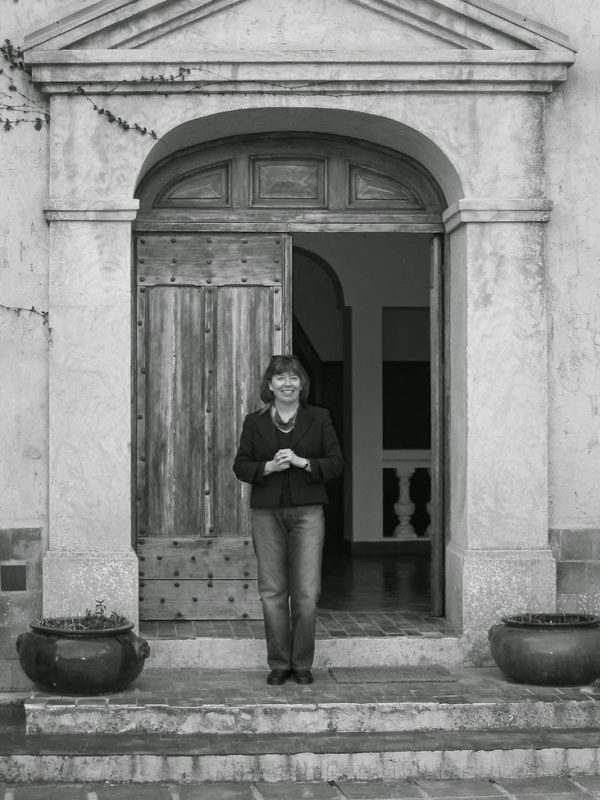 |
| Photo by Pamela O’Neill |
After some research, I selected CREA-Langues, a school near the 5th-century village of Moustiers-Sainte-Mairie in the Haute-Alpes department of Provence, about 100 kilometers (about 60 miles) from Lourmarin, where our family likes to hang our hats. This segment of my French Lessons was ten years ago now, but it remains as vivid today as when I lived through it.The 19th-century Monastère de Segries, home to the language school where I would be for seven days, was just six kilometers past Moustiers. As I approached the village, I suddenly remembered that, when I visited this area two years earlier, my cell phone could not pick up a signal. Panic set in when a furtive glance at my cell phone confirmed my fear. How would I make it through the week without a covert conversation in English?
Driving on, I saw a pair of towering gates. Forbidding as they appeared, I soldiered on and found lovely grounds, filled with oak, plane, and cypress trees, comfortably manicured gardens, and splashes of spring colors everywhere. The spacious grounds were divided into several courtyards, providing a cozy feel. A few students had already arrived whom teachers and other staff appeared to be greeting and accompanying to their respective rooms.
I was shown to my room by Florence, the pastry chef, who smiled warmly but gave no hint that she would be able to conjure up a single English sentence should the need arise. I would have a roommate and, never having had one before, I wondered what protocol was in determining which bed to take. The first one had slightly more privacy, but was a single. The second one was a double bed, but was devoid of any privacy and down a very long flight of stairs. It was closest to the bathroom, though I wasn’t sure whether this was a pro or a con. I would wait to discuss this with my roommate (in French, bien sȗr).
In the meantime, I freshened up, reviewed my “meeting others” notes, took a deep breath, and made my way out to meet my classmates. Lubricated with apéritifs of pastis and kir, the crowd bandied French around the courtyard with varying degrees of finesse and with unmistakably different accents representing nine different countries.There was Jan, a Dutch man with a confident French who was attending for the fourth time. He likes to vacation in France and to read French literature. His French intimidated me, so I was relieved to meet Ludwig, one of three men from Germany, who I later found out, was relieved to meet me for the same reason. Ludwig wanted to learn French because he had just purchased a house in Provence. Hans, a retired BMW test driver, was there to refine this French because he wanted to purchase a house in Provence. Wolfgang, whose thick German accent initially hid his many years of studying French, was enrolled in the course for reasons I was never able to decipher. Aline, from the Netherlands, and her son Mario from Belgium, both chatted freely in French with well-practiced gesticulations and seemed to have signed up for this immersion course like others sign up for cruises. Isobel, from Scotland, quiet but moving in and out of tenses and other languages with acrobatic ease, was there to accelerate her learning for the sake of learning (if I understood her correctly). Brian, a retired architect of British decent who lived in New York and wanted to travel more in Provence, carried on a lively conversation with another English man, Michael, a pulmonary physician who owned a house in France. It was a colorful group, spanning at least 40 years, all united in a common passion for the French language.
Eventually, we moved to the long table that, for the next six evenings, would be filled with 17 students, four instructors, and several administrative sorts. The wine was flowing as freely as the convivial conversations around me. As it was all in French, I tried to keep the subject on food—the area in which I had the largest French vocabulary—while conversing with those around me.
“J’adore les aubergines.” “Est-ce que vous voulez encore du vin?” “C’était très bon.”
Fortunately, food was the talk of the table on its own merits, without any help from me, so I was able to postpone the inevitable conclusions of my dinner companions that my knowledge of French didn’t extend much beyond the mousse au chocolat.
I met more classmates as the evening progressed, including my camarade-de-chambre, Marita, a young biologist from Finland who lived in Belgium and already seemed to have a great command of French. I was hopelessly inadequate in conveying my lack of preference for a particular bed, especially without a bed to which I could point, and equally as poor in comprehending her feelings on the subject. Somehow, later, we ended up in separate beds.
By the time coffee and tea were served that first evening, I felt myself sinking under the weight of my apprehension about what was to unfold during the remaining days. I could hardly wait for sleep to lift me out of my worries of impending mortification, at least for a few hours. Nearly everyone spoke much better French than I did.
My alarm sounded the next morning, long before I was fully restored. After the universal French petit déjeuner of sliced breads with butter, jams, and honey—uninspired but, mercifully, everything on the table was in my vocabulary—I walked over to the Grand Salon. There, at 9:00, we were to rendez-vous to be tested in order to establish four groups, each comprising folks with a similar level of French language ability. Would there be a group for me or would I be such an outlier that private tutoring would be necessary? Or worse, would I be tucked in a corner, tethered to a computer watching an online course?
I found a spot on a couch between Ludwig and Mario and began my journey deeper into the French language, but also into myself. Would my self-deprecating sense of humor and thick skin be enough to protect my self-esteem? How would I let my classmates know that I am more than my French allows me to communicate? Without my native language to convey who I am, I was left with just me.
Our first assignment required pairing up with a classmate whom we would interview and introduce to the entire group. As fate would have it, I was paired with Jan, the most advanced speaker in the group, now on his fourth round at this particular language school. (I would learn shortly that there were other language schools.) My face flushed and my heart raced. Learning French is a roller coaster ride, I reminded myself, the angst is followed by exhilaration. (I tried to repress the knowledge I had only ever ridden the old wooden roller coasters.)
The interview with Jan was a total of 15 painful minutes, during which time I tried without success to move beyond basic introductory phrases, but I had nowhere to go after establishing his marital status, the number of offspring he produced, where he lived, and, as I wrote above, his history of French language courses. Jan was no help. My reservoir of French words and phrases, by the middle of our interview, was completely enveloped in anxiety. I found myself madly scribbling down what little information I elicited from him in a highly idiosyncratic hybrid of phonetic French and English that probably led Jan to think that not only was I unable to speak French, I was also illiterate.
Time finally rescued me from this tortuous task, but the reprieve was brief as I slunk into my place on the couch between Ludwig and Mario only to be called on first. “Always try to go first while your audience is fresh,” advice from my mother flitted through my mind but the last thing I wanted that morning was a fresh audience. All eyes turned to me, so with belt buckled and bar lowered, I began. French words actually came out of my mouth and I was off. The vocabulary wasn’t impressive and Jan’s life was pretty much stuck in the present, but the nods from fellow students were supportive and the teachers’ smiles were reinforcing. I surprised myself that I passed on a fair amount of information about Jan and that my accent had not completely betrayed me.
I endured the written test next. It was four pages long, chock-full of “conjugaisons, grammaire, et mots.” Moans, groans, and occasional chuckles were audible throughout the room. Was it masculine or feminine? Passé composé or imparfait de l’indicatif? Être or avoir? I finally finished, extracting full confidence from only question, relating to food. What beverage would someone likely order from a café at breakfast, thankfully, “un grand crème,” long my standard order at our local café, was the only feasible answer.
A brief interview completely the class assignment process. What were my goals? Having witnessed my spoken French and reviewed my test, it would be apparent that any number of goals would match my vast needs.
I assured the teacher that I suffered from no delusions of great linguistic proficiency nor from false hopes of achieving such proficiency in the next six days. I refrained from offering to switch to cooking classes and, in reasonably good French, I proceeded to explain that my goals were modest: I wanted to break out of present tense and move beyond the first-person, singular conjugation. I would probably never fully appreciate the nuances separating the use of passé composé from imparfait de l’indicatif. Any movement forward would bring satisfaction, I told him, and he seemed relieved. Strangely so did I. Sometimes moving in the right direction, however slowly, is as good as it gets.
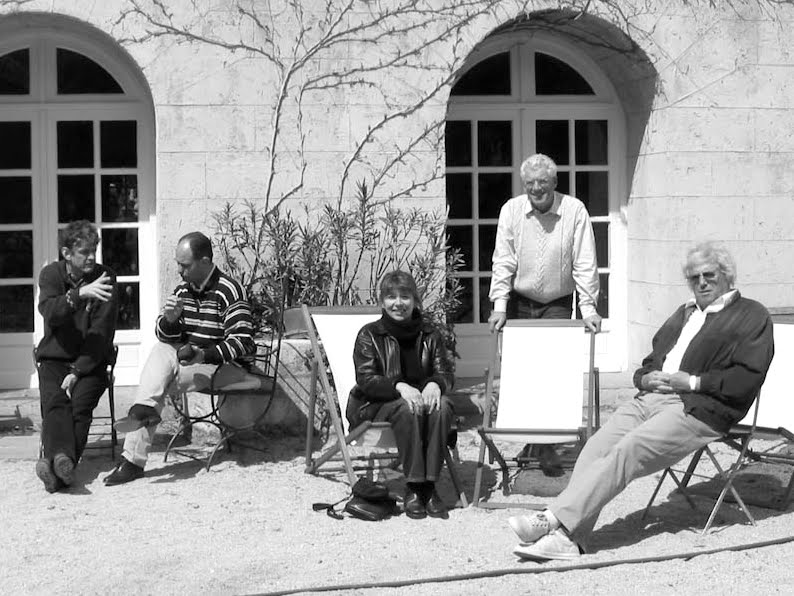 |
| My class at CREA-Langues |
I am often reminded of those French Lessons in Moustiers. I significantly advanced in my French, but I learned much more than just French in that week, as I have ever since embarking on my study of French many years ago.
Jan, the best French speaker in our group of students that spring in Moustiers, spent the rest of the class finding humor in my French until one of the teachers, fearful that Jan’s jabs might penetrate my thick skin, took me aside and told me that Jan may have a much better vocabulary—and he probably can conjugate 14 tenses—but he’ll never have the accent your French teacher ingrained in you nor will he have, the teacher hesitantly added, a crowd of classmates vying to sit next to him at the dinner table.
That conversation made me feel good but what really warmed my heart was knowing that my feelings of success were not measured in a contest with Jan. As I review my cryptically recorded 2015 aspirations—that aren’t much different from last year’s or any of the previous years—I need no reminding that success is measured in many ways and what nourishes one to move successfully toward personal fulfillment, feeling relevant, or just plain “okay” comes from the darnedest places sometimes.
I’m buckled in, ready for this year’s French Lessons. On y va!
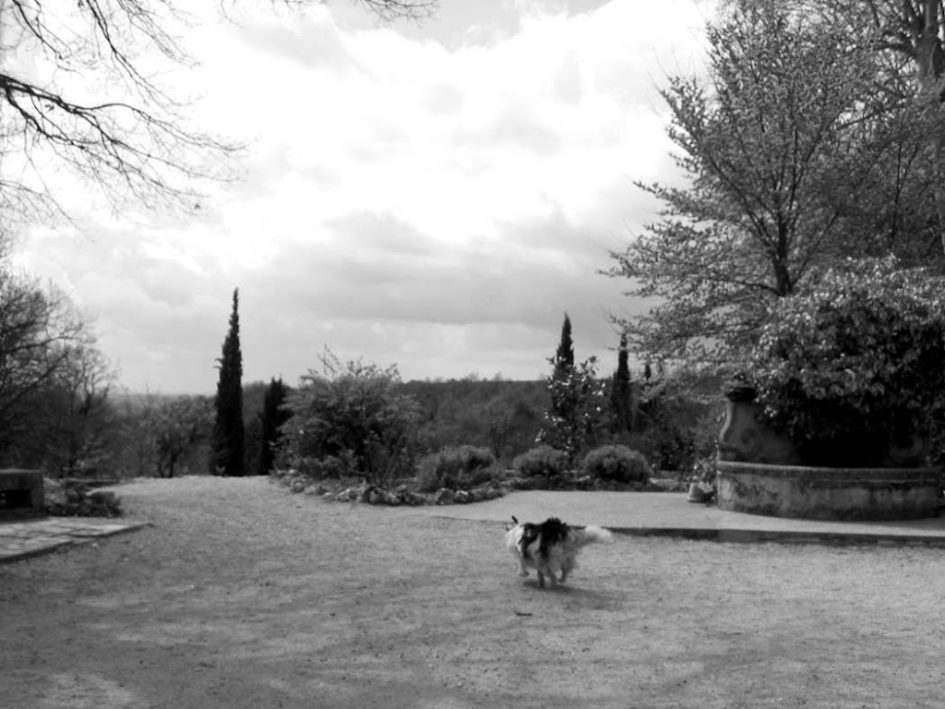 |
| The grounds at CREA-Langues. Photo by Susan Manfull |

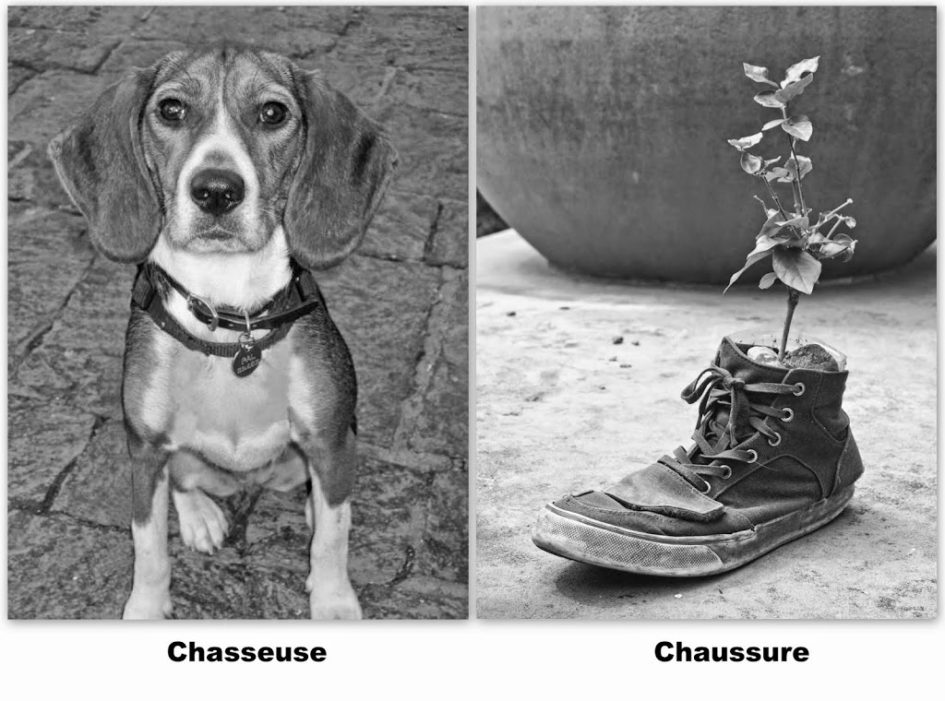
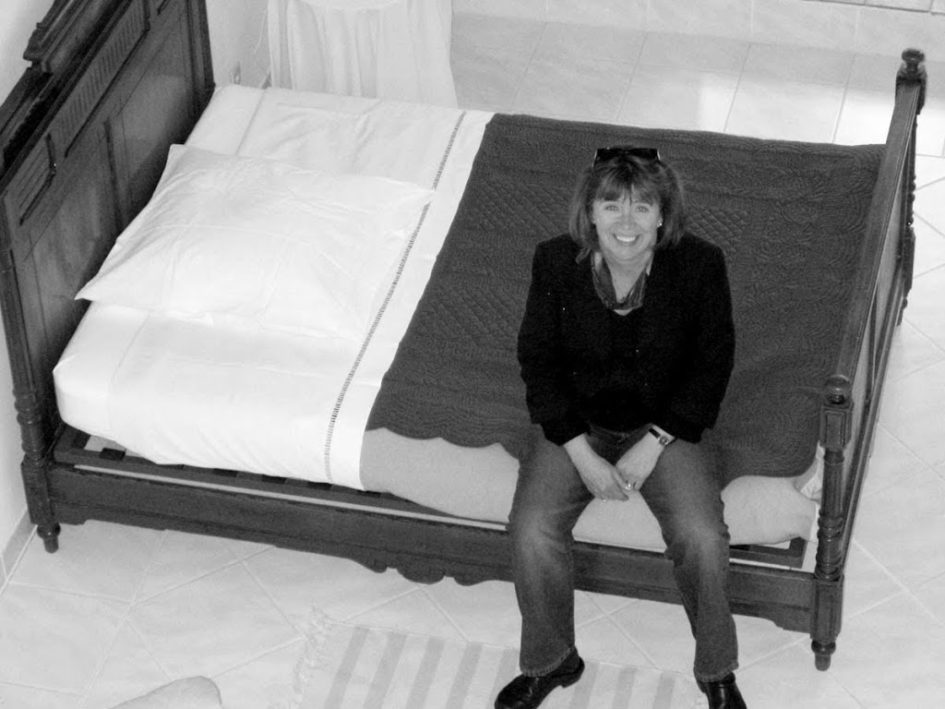
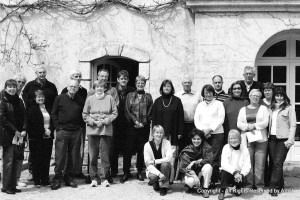





I thoroughly enjoyed your writing and can emphasize with you and your struggles with French. My husband and I have attended Italian language school in Montepulciano 9 times. Il Sasso is a terrific school with excellent teachers – that's why we keep going back. (Well, the wine in that area is a pretty big draw, also.) But every time we go, I feel that I am starting over again. I'm a former English teacher, and I find Italian grammar much more complex and challenging than English. But by the time we leave after two weeks, we are both pretty confident in a one-on-one conversation in Italian. And we assure each other that we will continue to speak Italian when we return home – but, alas, we don't follow through. Oh well, that gives us an excuse to return to the school and the area of Tuscany that we enjoy so much.
My first trip to Paris with two of my daughters was so exciting. None of us had ever been to a foreign country much less the most glamorous capital in Europe. We had a non-stop flight from LAX. Needless to say we were exhausted. We hit the Parsian streets running…pure adrenaline..and starving. We popped into a beautiful old grand restaurant and the host approached us to ask how many in our party…or so I thought. I had after all two years of high school French under my belt and was raring to show it off to my teenage girls. " Oui trois Monsieur". He rattles off something again. Me.."oui monsieur, trios" with a little less bravado this time. After giving me a disgusted look he rolls his eyes and motions us to follow him. We soon have our menus in hand and suddenly, keep in mind this is probably 15 minutes after we have been seated, my addled jet lagged brain has kicked into translation mode. He had said "hello Madame, smoking or nonsmoking." I really laugh when I think of it now and also think I could probably never make the mistake again because most if not all restaurants in Western Europe are nonsmoking. I am currently struggling with Tagalog. My instructor makes me repeat a new word over and over until perfect…unfortunately it sometimes takes 30 times. She has threaten to hit me with a big stick at times. Ha!
Having struggled to learn French for the last twenty years or so, I empathized with everything you said. I always feel like I leave my confident, competent self back in Oregon when we go to France and take on a new identity–tentative, shy, a little bumbling. At the same time I think there is a tradeoff–when you can't pull out all the nuanced and complex phrases that you might in English, you have to get right to the heart of what you are trying to say, dispensing with the chit-chat and going for the simple and true. I think you do a great job with your blog. I always find it interesting and informative and am filled with admiration for your work. Bravo.
Like me, you must wonder sometimes why you do it! But, we both know it's fun, especially with the food and wine…and the beauty of the area and the people and, for me, hope springs eternal. And let's not forget the good stories!
Thanks so much for your comment!
Denise, That's a terrific story. I hope you three had a good laugh! Now, you are studying Tagalog?! I had to look that up! I suspect there will be some funny stories emerging from trying out that language! Will you be traveling to the Philippines?
Sue, I spend a lot of time thinking about those very points. And being
in that immersion course brought both to light. As you wrote (and I
alluded to) what we think of as our personality is so hard to convey
without language. As you point out, though, one can still connect with
limited vocab and lots of smiles, eye contact, and body language. I
have a close relationship with a female friend in France that relies
entirely on the aforementioned and, perhaps strangely, i feel closer to
her that many other people with whom I carry on long conversations!
it's all so interesting!
Thank you for your positive feedback, Sue. I
still use your "Guidebook to the Luberon Region of Provence," now
dog-earned and stained. Terrific resource!
For readers who don't know this guidebook, visit: http://www.provencebyways.com/Index.htm
This comment has been removed by a blog administrator.
Susan, sadly the Philipines is not the safest place for Americans to travel to due to Muslim extremist groups. It's heart breaking because The people of the Philipines are such warm and generous people.
Oh, Susan! I feel your pain. In addition to the French pitfalls, I think of all the near misses I have had in Italian and German. In the Cinque Terre I had to be very careful not to order spaghetti with testicles when I wanted the mussels. (Cazze vs. cozze). In Germany, an umlaut makes a huge difference between schwul and schwül. One is humid (ü), and the other is gay/swishy/faggoty (u). A caution to us all to be very careful Makes me wonder what the English versions are…
This essay made me smile and even laugh at times. Thank you so much!
I'm terrible with speaking even a few words of any language so I try not to whenever possible. 😀
Thanks for the nice words about our guidebook, and the link. On the subject of language, a friend and I speak French–mine sort of halting–when I see her in Lourmarin, but when I am home we stay in touch by email–she writes me in French and I write her in English, which she reads without any problem. So I get to be my real self!
Such a beautiful conclusion, Susan: "success is measured in many ways and what nourishes one to move
successfully toward personal fulfillment, feeling relevant, or just
plain 'okay' comes from the darnedest places sometimes." A core truth we can all benefit by being reminded of!
Susan, I somehow got "off" your list and have missed your posts, but having just read this one on language learning…it was worth the wait! I have been living here in the Midi for just a few days over a year and my language progress (or lack thereof) is certainly my biggest disappointment. My 68 year old brain is just NOT absorbing French as I had hoped it might and I find myself doing exactly what I know is NOT the way to learn…talking to other anglophones! So many of your observations are the same as mine, only perhaps more eloquently expressed.
I go to two classes each week and make painfully slow progress, and I find that the more I learn the more mistakes I know could be made and so am more reluctant to open my mouth…the good news is that I understand a good deal more…except those (explitive deleted) recordings on the telephone that want you to chose numbers to push!
So, I have re-subscribed and will look forward to your next post.